Without federal dollars, FY21 state budget will be grim for counties
 Without numbers scheduled to be derived from the next consensus revenue estimating conference slated for late August, we can only estimate the anticipated state budget deficit for fiscal year 21, which beings Oct. 1, 2020. However, all indications lean toward a General Fund shortfall of more than $3 billion.
Without numbers scheduled to be derived from the next consensus revenue estimating conference slated for late August, we can only estimate the anticipated state budget deficit for fiscal year 21, which beings Oct. 1, 2020. However, all indications lean toward a General Fund shortfall of more than $3 billion.
Should the federal government not provide additional, direct and flexible funding to states and local governments, the Michigan Legislature will be forced to make drastic cuts to roads, local governments, universities, community colleges, corrections and human services, all primary recipients of unrestricted General Fund dollars each year. The State Budget Office is anticipating a $3.1 billion deficit, while sources in the Legislature are expecting something closer to $3.5 billion for FY21.
Counties were spared drastic cuts in the FY20 budget due to the allocation of federal CARES dollars to help mitigate the impact of the eliminated August revenue sharing payment. But without additional federal dollars, it’s safe to say we can anticipate losing a large percentage of the more than $200 million in statutory revenue sharing for FY21, in addition to cuts to other areas of the state budget.
Again, all hinges on the August Consensus Revenue Estimating Conference and the actions at the federal level regarding continued COVIS-19 mitigation funding.
For more information on this issue, contact Deena Bosworth at bosworth@micounties.org.
Legislative County Caucus expected to grow in 2021
 The ranks of MAC’s County Caucus in the Legislature should grow in 2021 following the results of the Aug. 4 legislative primaries this week.
The ranks of MAC’s County Caucus in the Legislature should grow in 2021 following the results of the Aug. 4 legislative primaries this week.
Five current county commissioners won their party’s primary in House districts that solidly favor one party or the other, setting them up to be elected to the House of Representatives in November:
- Bob Bezotte of Livingston County won the Republican nomination in House District 47.
- Ken Borton of Otsego County won the Republican nomination in HD 105.
- Felicia Brabec of Washtenaw County won the Democratic nod in HD 55.
- Julie Rogers of Kalamazoo County won the Democratic nomination in HD 60.
- Amos O’Neal of Saginaw County claimed the Democratic nomination in HD 95.
All will be favorites to win in November and take office in January 2021.
Christine Morse of Kalamazoo County was unopposed for the Democratic nomination in HD 61, which will be highly competitive in the General Election.
In the current Legislature, 26 members are former county commissioners and thereby members of the County Caucus. Three of them, though, have reached their term limits. Still, based on current trends, the caucus should grow to more than 30 members in 2021.
County millages gain approval in record-breaking primary election
 All but two county millage proposals gained voter approval in unofficial results in Tuesday’s primary election, which set a record for voter participation.
All but two county millage proposals gained voter approval in unofficial results in Tuesday’s primary election, which set a record for voter participation.
More than 2.5 million Michigan residents cast ballots on Tuesday, shattering the previous primary record of 2.2 million set in August 2018. The effects of the constitutional changes to voting that voters adopted in 2018 could be seen in this week’s results, as more than 2/3 of the ballots cast came through the option of “no reason” absentee (mail) balloting.
Of the 105 county-based millage requests on Tuesday monitored by the MIRS News Service, only 2 were rejected – one in Allegan County for its medical care facility and one in Iosco County for general operations. The majority of the requests were to renew or restore a millage, though several millage increases did gain voter support.
“Tuesday’s results represent an ongoing trend of Michigan county governments pushing extra-voted millages to fund services,” said Eric Scorsone, director of the Center for Local Government Finance and Policy. “Senior services, animal control, EMS and many others were funded.”
Michigan has 7,748,541 registered voters, of which the state deems 6,764,903 as active.
Last chance to register for the 2020 Virtual Annual Conference
 Legendary Michigan State University coach Tom Izzo will address attendees of the 2020 Virtual Annual Conference LIVE on Aug. 20 at 11 a.m.. After his remarks on leadership and team building, the national championship coach will take questions.
Legendary Michigan State University coach Tom Izzo will address attendees of the 2020 Virtual Annual Conference LIVE on Aug. 20 at 11 a.m.. After his remarks on leadership and team building, the national championship coach will take questions.- Plenary sessions that will feature MAC’s Legislative Update, the semi-annual “State of MAC” report and an address by MAC Board President Veronica Klinefelt
- The Annual Business Meeting, during which members will vote on MAC’s policy platforms for the 2020-21 year
- Seven policy workshops that will focus heavily on the implications of COVID-19 for counties in the coming months
- A Virtual Exhibitor Show that will allow attendees to select up to five firms from which to hear 10-minute presentations
- The conference registration fee is only $50 for members, which includes all county officials
- Attendees must register by a new deadline prior to the event – Aug. 7
- MAC will not accept “walk-up” registrations during the conference (this is due to credentialing and election procedures adopted for the conference)
Treasury sets next COVID webinar for Aug. 12; register now
 In partnership with the Michigan Municipal League, Michigan Townships Association and Michigan Association of Counties, the Michigan Department of Treasury is pleased to announce the joint webinar, “COVID-19 Updates and Resources for Local Governments,” at 2 p.m. on Aug. 12.
In partnership with the Michigan Municipal League, Michigan Townships Association and Michigan Association of Counties, the Michigan Department of Treasury is pleased to announce the joint webinar, “COVID-19 Updates and Resources for Local Governments,” at 2 p.m. on Aug. 12.
Topics will include updates on CARES Act funding for local governments including: first responder hazard pay premiums, public safety and public health payroll expenditures, August revenue sharing payments, and water utility assistance. Additional topics include opportunities for local government to support businesses and an update on FEMA grant dollars.
Participants can register and submit questions on the webinar’s registration page.
For more information on this issue, contact Deena Bosworth at bosworth@micounties.org.
Governor vetoes bill on housing senior COVID patients
 A bill to create regional facilities for COVID-19 patients that are separate from other nursing homes was vetoed this week by Gov. Gretchen Whitmer.
A bill to create regional facilities for COVID-19 patients that are separate from other nursing homes was vetoed this week by Gov. Gretchen Whitmer.
Senate Bill 956 would have created regional facilities for the housing of COVID-19 patients and required the Department of Health and Human Services (DHHS), in consultation with the Department of Licensing and Regulatory Affairs (LARA), to assess and report on the state’s response to COVID-19 in nursing homes and plan for any future response. It would also have prohibited admission or retention of coronavirus-positive individuals in nursing homes.
“Protecting the health and safety of nursing home residents and their staff continues to be a top priority for my administration,” said Whitmer. “Senate Bill 956 is nothing more than a political game that would relocate vulnerable seniors without any requirement for consent, doctor’s approval, or notification to patients and their families. It’s time for the Republican Legislature to get serious about protecting our most vulnerable and addressing the public health and economic crisis faced by our state. We look forward to continuing our work with stakeholders and legislators on the task force to develop real solutions that make sense for Michigan seniors and their families.”
“First, @GovWhitmer ignored experts who urged her not to expose nursing homes to COVID-19, with tragic consequences,” Senate Republicans wrote on Twitter in response to the governor’s actions. “Now, she has vetoed a bipartisan bill banning such a practice in the future. A slap in the face of Michigan families who have lost loved ones.”
Renee Beniak, executive director of the Michigan County Medical Care Facilities Council, serves on the Michigan Nursing Homes COVID-19 Preparedness Task Force created under Executive Order 135. The task force is tasked to adequately inform the state’s response to a potential second wave of COVID-19 and, by Aug. 31, 2020, produce a recommendation to the governor for an action plan on how to prepare nursing homes for any future wave of COVID-19 cases. Beniak said this week that the task force would be addressing the placement issue.
For more information on this issue, contact Meghann Keit at keit@micounties.org.
Compliance event to replace cancelled environmental conference
 The Michigan Environmental Compliance Conference will not be held this year due to COVID-19 social distancing requirements. However, the Michigan Department of Environment, Great Lakes and Energy has created a Michigan Environmental Compliance Week, a week-long virtual event dedicated to helping local governments comply with environmental regulations that apply to them. This training will include webinars, livestream chats with directors, office hours with regulatory staff, case studies, best practices and more. It is free, and continuing education opportunities will be available.
The Michigan Environmental Compliance Conference will not be held this year due to COVID-19 social distancing requirements. However, the Michigan Department of Environment, Great Lakes and Energy has created a Michigan Environmental Compliance Week, a week-long virtual event dedicated to helping local governments comply with environmental regulations that apply to them. This training will include webinars, livestream chats with directors, office hours with regulatory staff, case studies, best practices and more. It is free, and continuing education opportunities will be available.
Municipal Stability Board seeks comment on Best Practices and Strategies document
 Section 8 of Public Act 202 of 2017 requires the Municipal Stability Board to review and annually update a list of best practices and strategies that will assist underfunded local governments in developing their corrective action plans on pensions and retirement benefits. At its July 15 meeting, the board approved an updated best practices and strategies document, which can be viewed at the Board’s website along with other documents at Michigan.gov/MSB.
Section 8 of Public Act 202 of 2017 requires the Municipal Stability Board to review and annually update a list of best practices and strategies that will assist underfunded local governments in developing their corrective action plans on pensions and retirement benefits. At its July 15 meeting, the board approved an updated best practices and strategies document, which can be viewed at the Board’s website along with other documents at Michigan.gov/MSB.
The best practices and strategies document includes the following three best practice principles: Plan Funding, Modern Plan Design, and Effective Plan Administration. It also includes detailed corrective action plan approval criteria, including underfunded status, legality, and affordability.
The Board approved this document for public comment for a period of 30 days. Following the public comment period, the board will reconsider the document at their next scheduled meeting. Please send your comments to Treas-MunicipalStabilityBoard@michigan.gov by Aug. 19, 2020, with the subject line “Best Practices Comment: 2020”.
 Staff picks
Staff picks
- Health professionals are the most trusted sources of information on COVID-19 (Center for Health and Research Transformation)
- Animated map: The history of U.S. counties (visualcapitalist.com)
- How debt collectors are transforming the business of state courts (Pew Trusts)
- Michigan Regulated Dams Map (Michigan Department of Environment, Great Lakes and Energy)

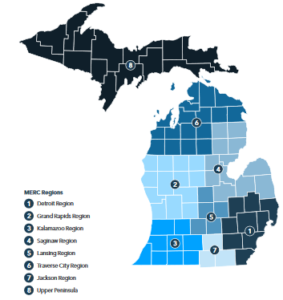 Gov. Gretchen Whitmer tightened restrictions on social and entertainment activity in Northern Michigan today in response to rising caseloads of COVID-19 in Michigan.
Gov. Gretchen Whitmer tightened restrictions on social and entertainment activity in Northern Michigan today in response to rising caseloads of COVID-19 in Michigan. “Emergency Medical Services (EMS) and emergency departments (EDs) in Michigan have both seen substantial increases in opioid overdoses since the beginning of the COVID-19 epidemic,” the Michigan Department of Health and Human Services said in a release this week.
“Emergency Medical Services (EMS) and emergency departments (EDs) in Michigan have both seen substantial increases in opioid overdoses since the beginning of the COVID-19 epidemic,” the Michigan Department of Health and Human Services said in a release this week. On Aug. 18, the Michigan Department of Treasury will host a webinar event to assist local governments in the management and sustainability of their pension and retiree health care (OPEB) systems. This webinar, which will run from 2 p.m. to 3:15 p.m., provides additional resources in response to ever-changing economic conditions.
On Aug. 18, the Michigan Department of Treasury will host a webinar event to assist local governments in the management and sustainability of their pension and retiree health care (OPEB) systems. This webinar, which will run from 2 p.m. to 3:15 p.m., provides additional resources in response to ever-changing economic conditions. Legislative leaders and the Governor’s Office reached final agreement this week
Legislative leaders and the Governor’s Office reached final agreement this week  Following a Michigan Supreme Court ruling that gutted the system of tax foreclosures that counties have used for years, MAC will be forming a workgroup to study ways to address the consequences of the decision.
Following a Michigan Supreme Court ruling that gutted the system of tax foreclosures that counties have used for years, MAC will be forming a workgroup to study ways to address the consequences of the decision. Legendary Michigan State University coach Tom Izzo will address attendees of the 2020 Virtual Annual Conference LIVE on Aug. 20 at 11 a.m., MAC confirmed this week. After his remarks on leadership and team building, the national championship coach will take questions.
Legendary Michigan State University coach Tom Izzo will address attendees of the 2020 Virtual Annual Conference LIVE on Aug. 20 at 11 a.m., MAC confirmed this week. After his remarks on leadership and team building, the national championship coach will take questions.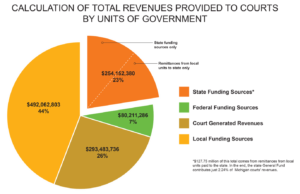 Extension of the authority of trial courts to levy costs on defendants is one step closer to enactment this week, after the Senate Judiciary Committee approved
Extension of the authority of trial courts to levy costs on defendants is one step closer to enactment this week, after the Senate Judiciary Committee approved  This week, legislative leaders and bill sponsors teed up September priorities to
This week, legislative leaders and bill sponsors teed up September priorities to  Millions of dollars are available to counties for reimbursements for public health and safety workers and it’s important to begin filing for aid quickly, MAC Governmental Affairs Director Deena Bosworth said
Millions of dollars are available to counties for reimbursements for public health and safety workers and it’s important to begin filing for aid quickly, MAC Governmental Affairs Director Deena Bosworth said  All during the COVID-19 pandemic, MAC has continued to urge Senate leaders to get
All during the COVID-19 pandemic, MAC has continued to urge Senate leaders to get 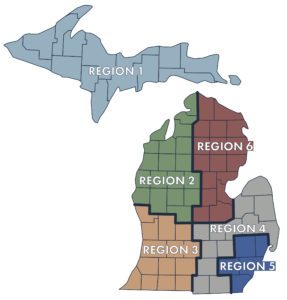 A single candidate filed in each of the six races for seats on the MAC Board of Directors, with the filing period closing on Thursday.
A single candidate filed in each of the six races for seats on the MAC Board of Directors, with the filing period closing on Thursday.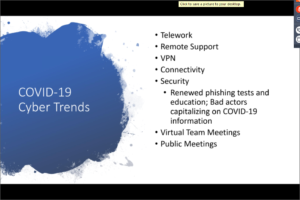 NACo has set a July 23 webinar on “How Counties Can Continue to Address Ransomware to Ensure Safe and Secure Elections.”
NACo has set a July 23 webinar on “How Counties Can Continue to Address Ransomware to Ensure Safe and Secure Elections.”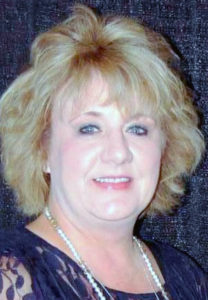 Michigan County Medical Care Facilities Council Executive Director Renee Beniak has been appointed by Gov. Gretchen Whitmer to serve on the
Michigan County Medical Care Facilities Council Executive Director Renee Beniak has been appointed by Gov. Gretchen Whitmer to serve on the 
 MAC’s Governmental Affairs Team will brief members on the latest developments in federal and state assistance in combating COVID-19 during a webinar on Monday, July 13.
MAC’s Governmental Affairs Team will brief members on the latest developments in federal and state assistance in combating COVID-19 during a webinar on Monday, July 13. Bills that would have allowed individuals and businesses to delay, without penalty, their summer 2020 property tax payments were vetoed by the governor this week. In her veto letter, Gov. Gretchen Whitmer cited constitutional reasons and overwhelming opposition from schools and local units of government for her decision.
Bills that would have allowed individuals and businesses to delay, without penalty, their summer 2020 property tax payments were vetoed by the governor this week. In her veto letter, Gov. Gretchen Whitmer cited constitutional reasons and overwhelming opposition from schools and local units of government for her decision. MAC members that are part of the national prescription opiate litigation (case 17-md-2804) multi-district litigation against opioid manufactures, distributors and retailers
MAC members that are part of the national prescription opiate litigation (case 17-md-2804) multi-district litigation against opioid manufactures, distributors and retailers  The Protecting Local Government Retirement and Benefits Act (PA 202 of 2017) requires the Municipal Stability Board to develop best practices, approve of corrective action plans and to monitor those plans. At its June 17, 2020, meeting, the board proposed changes to the
The Protecting Local Government Retirement and Benefits Act (PA 202 of 2017) requires the Municipal Stability Board to develop best practices, approve of corrective action plans and to monitor those plans. At its June 17, 2020, meeting, the board proposed changes to the 




